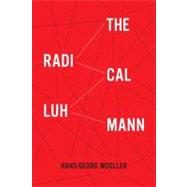The Radical Luhmann
, by Moeller, Hans-Georg- ISBN: 9780231153782 | 0231153783
- Cover: Hardcover
- Copyright: 10/21/2011
Niklas Luhmann (1927-1998) was a German sociologist and system theorist who wrote on law, economics, politics, art, religion, ecology, mass media, and love. Luhmann advocated a radical constructivism and antihumanism, or "grand theory," to explain society, situating it within a universal theoretical framework. Nevertheless, despite being an iconoclast, Luhmann is traditionally viewed as a political conservative. Hans-Georg Moeller challenges this legacy, repositioning Luhmann as an explosive thinker intensely critical of Western humanism. Moeller focuses on Luhmann's paradigm shift from philosophy to theory, which introduced new perspectives on the contemporary world. For centuries, the task of philosophy meant transforming contingency into necessity, in the sense that philosophy enabled an understanding of the necessity of everything that appeared contingent. Luhmann pursued the opposite-the transformation of necessity into contingency. Boldly breaking with the heritage of Western thought, Luhmann denied the central role of humans in social theory, particularly the possibility of autonomous agency. In this way, after Copernicus's cosmological, Darwin's biological, and Freud's psychological deconstructions of anthropocentrism, he added a sociological "fourth insult" to human vanity. A theoretical shift toward complex system-environment relations helped Luhmann "accidentally" solve one of Western philosophy's primary problems: mind-body dualism. By pulling communication into the mix, Luhmann finally rendered the Platonic dualist heritage obsolete. Moeller's clear presentation opens these formulations to a wide audience and directly relates Luhmannian theory to contemporary issues in democracy, art, education, justice, human rights, and mass media. He also captures for the first time a Luhmannian attitude toward society and life, defined through the cultivation of modesty, irony, and equanimity.






